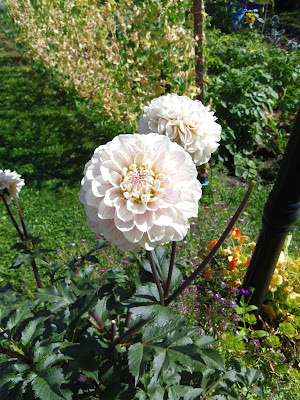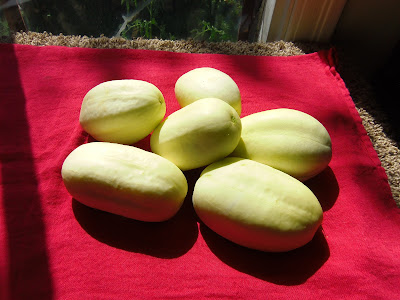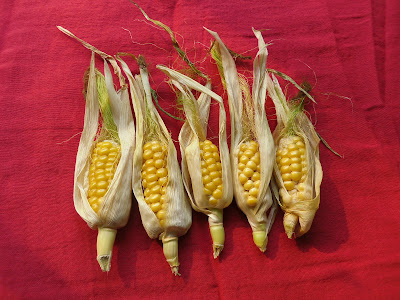September, already. Time flies!
Smoky skies are back. The last few days of August brought a yellow/orange hue to the air and the sun looked like neon during sunrise and sunset. There are large wildfires in southern BC (particularly impacting Kelowna), in the Northwest Territories (most of the city of Yellowknife has been evacuated), and northern Alberta.
We also had another stretch of 30+ degree weather at the end of August. The overnight temps are forecast to be well above zero - sometimes in the double-digits - for the next two weeks. The weather is so different from when I started gardening here years ago. Hard ("killer") frosts were not uncommon at the end of August and were almost guaranteed during the first week of September. More than once, I found myself in early September running around the yard, shivering in the freezing rain, buckets in hand, harvesting the tomatoes, peppers, and any remaining summer squash that were on the plants because a hard frost was imminent. It has been a number of years since I've had to do that. If the forecast is accurate, we might not have frost until mid-to-late September. It's wonderful for the winter squash - they always thrive in a nice, long season. Still, the change in the growing season has been so dramatic in recent years that it leaves me feeling a little uneasy.
The last of the peas and string beans were harvested mid-month and I canned another batch of relish (Fresh Dill Cucumber Relish) and a batch of peach butter. I thought I was finished with canning, but I made a small batch of plain sweet pickle relish (using zucchini rather than pickling cucumbers) last week. Recipe in the video below.
On to the pictures! (Click to enlarge, if you wish.)
Volunteer sunflowers in the south garden.
Double-Click cosmos
Dahlias
Volunteer petunias
Zucchini (one of the last ones!)
Fernleaf dill, Double-Click cosmos, and Bush Delicata squash (which haven't, from what we can tell, produced very well. I'll try them again in another spot).
Dragon's Egg cucumbers
China Asters
They must taste good. It would appear that a visiting deer snacked on them!
Strawflowers
Pink and yellow dahlias (Unwin's Mix)
Pansies
A "pom pom" marigold (variety unknown)
Little Firebirds nasturtiums and purple alyssum.
Pansies
The apple tree is loaded this year, much to our delight.
Sunflowers in the butternut squash bed...
...and more in the French pumpkin (Galeux D'Eysines) bed.
The Galeux D'Eysines are coming along well. After the vines were topped and the tiny, stunted pumpkins removed mid-month, there are 7 medium to large ones remaining.
Burpee's Butterbush squash (a small butternut variety).
A few cobs of the Gaspé Flint corn grown this summer. I planted the seeds in a smaller space and in fewer numbers than I did three years ago. As a result of that, and likely of the dry weather this summer, this harvest isn't as abundant or the cobs as well developed as they were then. The cob pictured second from the left is the size they typically grow.
Here are the ingredients and general instructions for the Sweet Pickle Relish canning recipe featured in the video above (and taken from The Complete Book of Pickling).
- 10 cups chopped or grated cucumbers, or zucchini
- 1/3 cup canning salt
- 2.5 cups white sugar
- 2 cups white vinegar
- 1/4 tsp ground black pepper
Mix chopped/grated cucumber or zucchini with pickling salt in a stainless steel or glass bowl. Add cold water to ~ 1 inch above mixture, stir, and set aside in fridge for 8 hours.
Strain cucumber mixture, rinse well in cold water, and allow to drain. Squeeze excess water from the cucumber mixture and set aside.
In a large stainless steel pot, combine white sugar, white vinegar, and pepper to make the pickling brine. Stir over medium heat until sugar is dissolved. Bring to a gentle boil, add cucumber mixture, and bring back to a boil, stirring frequently. Reduce heat and simmer for 10-15 minutes.
Fill washed and prepared 250mL or 500mL jars, leaving 1/2 inch headspace. Process in canner for 10 minutes (adjust canning time for altitude as necessary). Remove jars from canner after 5 minutes resting time and let jars sit undisturbed for 24 hours before checking seals and storing.
































No comments:
Post a Comment